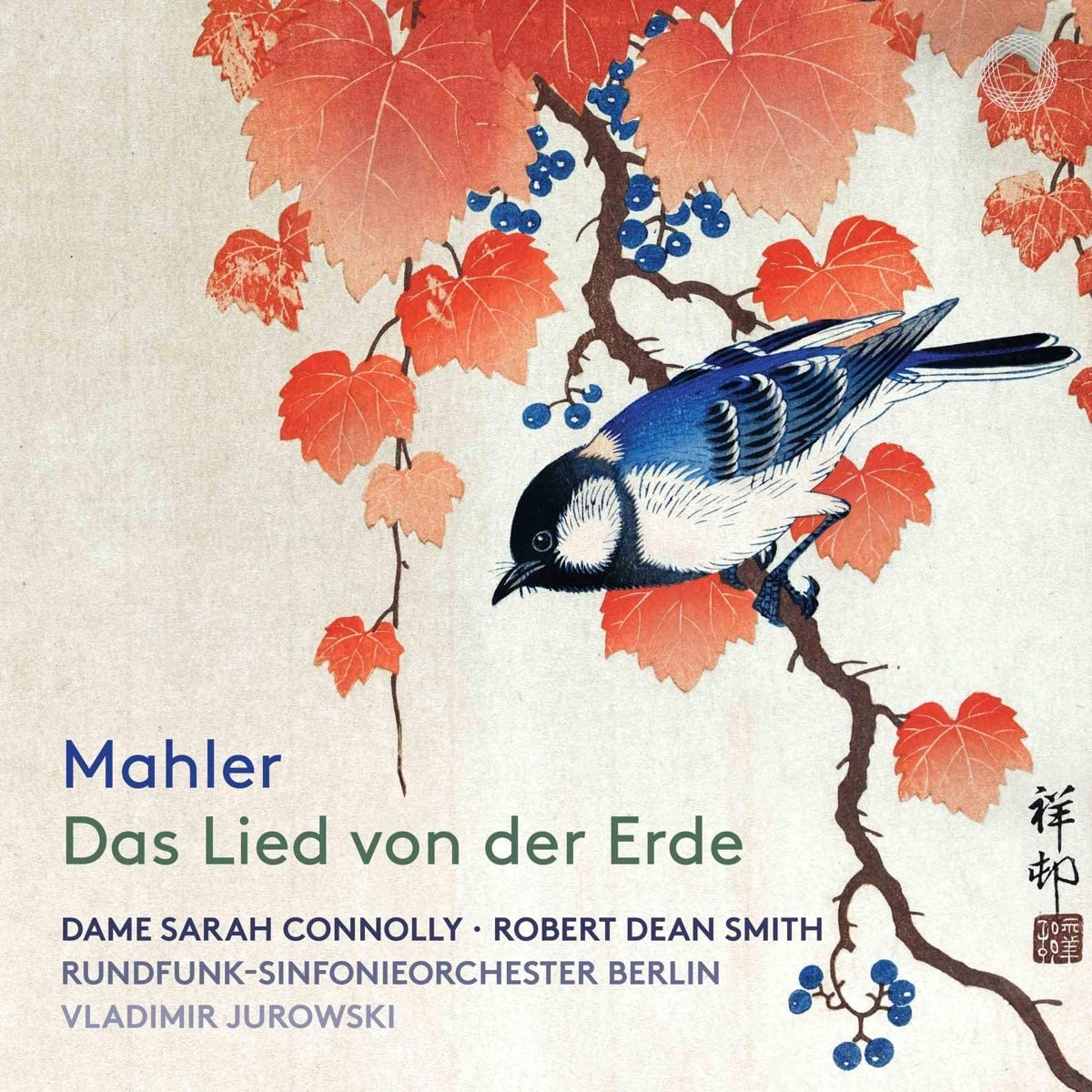MAHLER Das Lied von der Erde (Sarah Connolly; Robert Dean Smith)
View record and artist detailsRecord and Artist Details
Genre:
Vocal
Label: Pentatone
Magazine Review Date: 09/2020
Media Format: Super Audio CD
Media Runtime: 63
Mastering:
DDD
Catalogue Number: PTC5186 760

Tracks:
| Composition | Artist Credit |
|---|---|
| (Das) Lied von der Erde, 'Song of the Earth' |
Gustav Mahler, Composer
Berlin Radio Symphony Orchestra Robert Dean Smith, Tenor Sarah Connolly, Mezzo soprano Vladimir Jurowski, Conductor |
Author: Edward Seckerson
This is a performance of such distinction that regardless of one’s personal view of the piece – that is, exactly how objective or subjective you want or need your Mahler to be, and whether you favour an alto or baritone voice – it must be considered a prime contender for anyone’s library.
It was recorded in 2018 in Berlin’s Philharmonie and offers the kind of forensic balancing and clarity that only an expertly engineered recording can achieve without drawing undue attention to itself. Clearly Jurowski is of the opinion (and Adám Fischer essayed this very point in the booklet notes for his recent Düsseldorf recording – AVI-Music, 6/19) that given the symphonic nature of the piece, the solo voices – ie the singers – are an integral part of the orchestral texture and in ever-shifting dialogues with their ‘instrumental’ counterparts. So the singing voices aren’t soloistically spotlit but rather subsumed into the orchestral sound, so we get a wonderfully subtle interplay between the many ‘voices’ in this aural canvas, with Jurowski illuminating the texture from within, as it were, with all the finesse required of a seasoned watercolourist.
Listen to the solo cello in ‘Der Einsame im Herbst’ reach out and shroud the alto voice with the line ‘a cold wind forces them to bow their stems low’ – the chill of the image finding solace in the warmth of their exchange. ‘I weep in my solitude’, says the poet, and solo bassoon and oboe, again in their immediacy, eloquently convey what the singing voice and words alone cannot. Then there are the animated figurines busying themselves in the porcelain pavilion of ‘Von der Jugend’ and the astonishingly improvisatory oboe plaints of ‘Der Abschied’, which are tangible in ways they never can be in the concert hall. In short, I cannot imagine a more revealing exposition of Mahler’s instrumental colorations. Everything stands in such sharp relief. And because there is literally nowhere to hide, the soloists of the Berlin Radio Symphony Orchestra are revealed for the outstanding artists they individually and collectively are.
Let me celebrate the singers now. You get none of that hard-pressed ‘fudging’ from Robert Dean Smith in the notorious tenor role. The challenging Heldentenor reach of the opening ‘Das Trinklied vom Jammer der Erde’ holds no fears for him and he gives full value to those shining top notes (some cannot come off them soon enough) as surely as he does to the ‘optimistic’ grace notes that lend an almost archaic elegance to this elemental drinking song. Of course, he is not fighting the orchestra, which helps, but there is clarity in his words and an unbridled virility from Jurowski which might not be possible in the concert hall. And in that marvellous apparition of the ‘howling ape’ squatting at the graveside, the orchestra can properly let rip in its lust for death. Conversely, his lighter touch in the other drinking song ‘Der Trunkene im Frühling’ doesn’t sound, as it sometimes does, like a Heldentenor masquerading as a lyric tenor.
I cannot stress enough how effectively Jurowski conveys the ethereal ‘natural world’ beauty of the score. It is cool and lucid and thoroughly autumnal. Like a true pantheist (and in complete kinship with Mahler) he stands back from it, marvelling at its intricacies while respecting the stillness and balance. You don’t hear that he loves the music too much – which is inescapable when you listen to the emotive Bernstein in his wonderful Vienna Philharmonic classic with Dietrich Fischer-Dieskau and James King.
Choosing a baritone over an alto is very personal, of course (there is some evidence hinting at Mahler’s preference for the former) but one should – one needs – to experience both, and Sarah Connolly in her absolute prime here is special, no question, with a range of autumnal shades and a very personal identification with the texts that has few rivals post-Ferrier and Baker. Again, she does not ‘show’ her every emotion as Ferrier does in the recently beautifully restored live recording with Bruno Walter and the New York Philharmonic on Somm (better in my view than the classic Decca studio recording) but rather contains those feelings to poignant effect. Then again, there are moments in the final setting, such as the heartfelt expansion on the line ‘Oh look! Like a silver boat, the moon floats on the blue sky-lake above’, where her rapture in response to the image is completely unguarded, ‘in the moment’, and glorious. Later there is that line ‘Ich suche Ruhe für mein einsam Herz’ (‘I seek peace for my lonely heart’ – a line excluded from the texts here because strangely the booklet prints the original poems and not Mahler’s adaptation of them) in which Mahler echoes the vocal line in an unforgettable swell of solo clarinet. It doesn’t seek to break your heart as does Bernstein in his version but its discretion – as with so much else here – speaks volumes.
Discover the world's largest classical music catalogue with Presto Music.

Gramophone Digital Club
- Digital Edition
- Digital Archive
- Reviews Database
- Full website access
From £8.75 / month
Subscribe
Gramophone Full Club
- Print Edition
- Digital Edition
- Digital Archive
- Reviews Database
- Full website access
From £11.00 / month
Subscribe
If you are a library, university or other organisation that would be interested in an institutional subscription to Gramophone please click here for further information.




